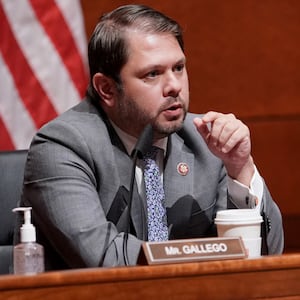It could be a two- or three-person race, or potentially even more. Democratic Party leaders could coalesce around a candidate, or everyone could remain neutral. There might be an incumbent, there might not.
For Rep. Ruben Gallego (D-AZ), there’s a sea of uncertainty surrounding his 2024 Senate campaign in Arizona. And even though he went from the favorite for the Democratic nomination to an even bigger favorite after Sen. Kyrsten Sinema switched from being a Democrat to an independent in December, Gallego may now have a trickier battle to actually win the Senate seat.
Gallego’s campaign was the furthest thing from a surprise. For months, it was an open secret that he was exploring the idea, especially as he made an increasing habit of bashing Sinema’s work on the Hill.
That strategy was simple enough. Gallego saw what everyone else did: an opening.
A Morning Consult poll conducted in December found that Sinema had a 59 percent disapproval rating among Arizona Democrats. Gallego likely would have crushed Sinema in a head-to-head race for the Democratic nomination, which is why Sinema—in characteristically splashy fashion—announced that she was now an independent, likely sidestepping the primary and heading straight to the general election with, presumably, Gallego and the Republican nominee.
But a funny thing has happened since Sinema’s switch—Gallego has still been polling in front of everyone, in every combination.
Instead of drawing solid support from Democrats and Republicans, Sinema has been polling in the teens, as Gallego narrowly but consistently beats out a host of potential GOP nominees. The polls also have him edging out Republicans in head-to-head matchups without Sinema by about the same margins.
For now, Gallego has managed to solidify Democratic support and have Sinema’s backing come mostly from Republicans, though that dynamic could certainly change over the next two years. While he started his campaign on a steady diet of criticizing Sinema, he’s more recently seemed to restrain himself, as he figures out what exactly this race will look like.
“We’re not going to be the anti-Sinema option; we’re the Arizona option,” Gallego told The Daily Beast on Thursday. “The candidate that actually goes and speaks to his constituents, actually has town halls, is actually fighting for their values.”
He said, “at the end of the day,” that’s what would set him apart from the rest of the field—both Sinema and whomever Republicans nominate.
A Marine war veteran who battles PTSD, Gallego bootstrapped his way through Harvard. He worked his way up through the political ranks and mulled a Senate run in 2019 before ultimately opting against it. While he doesn’t always come across as a stern and regimented Marine, his military experience has served him well in the political arena. He’s fond of ridiculing how Republicans handle firearms on Twitter—displaying that, unlike the AR-15-loving conservatives cosplaying as gun nuts, he actually knows what he’s talking about—and he sprang into action on Jan. 6, hopping up on the seats in the House chamber to facilitate the member evacuation.
At 43, he’s young—at least in terms of Congress. He’s not hesitant about profanity. And he’s a progressive, unlike Sinema, whose curiously moderate inclinations have been a frequent frustration for Democrats in recent years.
But Gallego has plenty of challenges in seizing one of Arizona’s Senate seats. For one, he has nowhere near Sinema’s name recognition. For another, no one really knows what this Senate contest will look like. He could still face stiff Democratic opponents in the primary—perhaps even Sinema, if she changed her mercurial mind—and the general election is still far off. There’s no telling what kind of support Sinema could draw in two years.
His campaign argues the questions are all just part of the process. He’s compiled an early roster of consultants and pollsters that describe themselves as a sort of winner’s row, pulling top staffers from the campaigns of Sens. John Fetterman (D-PA), Raphael Warnock (D-GA) and Mark Kelly (D-AZ).
Top Gallego adviser Rebecca Katz, a former Fetterman adviser herself, told The Daily Beast the race is all about contrast. “Sinema forgot who she was fighting for,” she said.
“She ran ads to say that she was going to lower the cost of prescription drugs, and then she was, you know, a deciding vote for Big Pharma,” Katz continued. “It’s that, you know, she said she was going to protect a woman’s right to choose and then she’s against scrapping the filibuster… those contrasts [are] how we can tell Ruben’s story.”
Chuck Rocha, a Bernie Sanders alum, has also joined to lead Gallego’s Latino voter outreach, among other efforts. He’s insistent that Gallego hopping in early will help him reach Arizona’s wide array of diverse communities, which Rocha insists Democrats often wait too far into the cycle to tackle.
“The party’s nominees for Republican or, if Kyrsten Sinema runs as an independent, are in limbo. What’s not in limbo is the way people are feeling right now,” Rocha told The Daily Beast. “And it don’t really matter who the nominees are.”
Gallego has hired GBAO Strategies, a pollster that worked on Warnock and Fetterman’s campaigns. They’re as optimistic as the rest. Principal Margie Omero told The Daily Beast, “Of course, there’s going to be a lot that changes… That said, I think it’s clear that Gallego, who is still introducing himself to voters, leads in basically every matchup.”
Gallego insists his team will help set him apart.
“We’ve already crossed over 90,000 individual donations—20,000 being from Arizona. So we’re gonna have, you know, the staff power, the brainpower and the money that we need to send out the right message to make sure that we win,” Gallego said.
Gallego has thus far been correct that Sinema would cannibalize more voters from the GOP side than the Democratic side. He told Politico in January that “Sinema is not going to split the Democratic vote. She’s even more unpopular with Democrats than she is with Republicans, and actually has a better chance of taking votes away from their side if they nominate another MAGA candidate.”
That’s been true thus far, but things could change quickly.
In a series of interviews, nobody from Gallego-world expressed hesitation about the uncertainty of what this race would actually look like. Katz argued whether it’s a two-person or three-person race isn’t a concern for early strategy.
“It doesn’t change our calculus,” she said.
Gallego was even more confident. “We win no matter what,” he said.
Asked if there are concerns about whether the looming Sinema question could have an impact on future recruitment of Democratic staff, Rocha brushed aside the idea.
“No. I don’t worry about it. I mean, it’s obviously something you think about virtually in every race… But what you do is you create the infrastructure to where it runs, and you can recruit the best talent, no matter who the other people are. You want people to want to work for Ruben, and that means people who align with his values,” he said.
Gallego isn’t imagining the idea of Sinema being vulnerable. While many progressive bids over the years have targeted incumbents over broad arguments that it’s time for a change in leadership, Sinema is one of the most divisive Democrats in American politics.
On one hand, Sinema has built a record as a sort of dealmaker in Congress. She was able to work across the aisle with Republicans on key legislation last term, including policies that Democrats ultimately campaigned on, like codifying same-sex marriage into law and the bipartisan infrastructure bill.
And she’s not shy about building connections with the GOP—even as many lawmakers often keep inter-party mingling behind closed doors. She’s been openly friendly with Senate Minority Leader Mitch McConnell (R-KY) and other Republicans like Sen. Mitt Romney (R-UT).
But on the other hand, in a 50-50 Senate last term, she buddied up with Sen. Joe Manchin (D-WV) to block huge swaths of Democratic ambitions. She is against abolishing the filibuster—or even creating new filibuster carve outs—a position that she’s never wavered on, but that other Democrats have become more open to.
There are two other independents in the Senate: Sens. Bernie Sanders (I-VT) and Angus King (I-ME). Both loyally caucus with Democrats. Sinema hasn’t indicated whether she’ll follow that same path, though she’s stuck with Democrats on most votes this Congress. Still, a bombshell report last month found she’s been trashing her fellow Democrats in private donor talks, insisting their weekly caucus meetings are just “old dudes eating Jell-O.”
In Sanders and King’s cases, Democratic leadership and party campaign arms have stayed behind them. But their allegiance wasn’t as difficult to pinpoint.
If Sinema chooses to run again, she could still receive that same courtesy—and the fundraising and resources that come with it. Both Senate Majority Chuck Schumer and the Democratic Senatorial Campaign Committee have been quiet on the matter, for now.
Sinema’s team declined to comment on this piece.
If that happens, Gallego would be going up the money creek without a paddle, counting entirely on individual donors. But in classic Gallego fashion, he insists that’s not a concern.
“There is no way that Kyrsten Sinema is going to win this. It doesn’t matter how you slice the numbers. When the DSCC and all those groups start looking at it, start doing the focus groups like we have, they’ll see that she’s extremely vulnerable and she is—there’s really no path for her to win this,” Gallego said.
Should Sinema run, that decision between backing her or backing the Democratic nominee is a big one. Senate Democrats don’t have any obvious pickup opportunities in next year’s elections, and they’ll be on defense in a number of swing states, including Arizona.
Some Democratic operatives are banking on a far-right wacko candidate to win the Arizona GOP nomination, like former gubernatorial nominee Kari Lake, making Democrats’ path toward victory more simple. But McConnell is intent on recruiting a more practical option, like former Gov. Doug Ducey.
Gallego hopes the high stakes will drive Democrats—in Washington and Arizona—to come to his corner. But he’s not pressuring Sinema any which way, insisting it’s up to her to “decide if she wants to end her career in third place.”
“If you want to hold the Senate, the only way you can do that is to back me,” he said.









